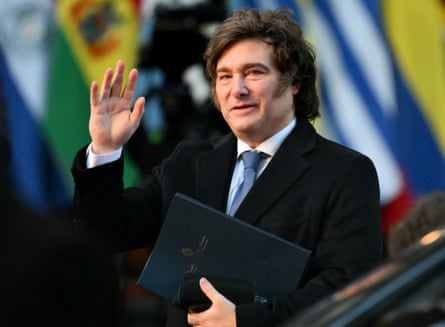Leonardo Amarilla is desperate. The geneticist and PhD in biological sciences holds a coveted position as a full-time researcher at Argentina’s prestigious national science council, Conicet, studying how to improve yields of crops such as peanuts, soya beans and sunflowers.
But after President Javier Milei imposed sweeping austerity measures, known locally as his “chainsaw” plan, Amarilla’s salary plummeted and he found he could no longer afford basic groceries or support his ageing parents.
In an effort to make ends meet, he signed up to drive for Uber, working four hours a day during the week and six on weekends.
“I’m working between 12 and 13 hours a day [overall],” he says. “I’m exhausted. It affects the quality of my research, and my teaching. I used to get home and read scientific papers – now I go home and immediately head back out to drive passengers around.”

Amarilla is far from alone. Faced with quickly falling salaries, many of Argentina’s top scientists are abandoning research or taking on extra work – as ride-share drivers, food vendors, tutors or artisans.
Since Milei took office in December 2023, Conicet salaries have lost nearly 35% of their purchasing power, according to a report by the Ibero-American Center for Research in Science, Technology and Innovation (CIICTI). Meanwhile, the government froze the hiring of 850 researchers who had already been approved under the previous administration. Other state scientific institutions, like the atomic commission or the agricultural institute, have also been targeted by the president’s chainsaw measures.
Milei, a self-styled “anarcho-capitalist” and climate change denier, has targeted Argentina’s public science institutions, viewing them as bloated and unnecessary. “If you think your research is so useful,” he said in a 2024 speech, “go to the market like any other citizen – publish a book and see if people are interested.”
His administration’s budget slashing has extended well beyond salaries. According to the UK’s Inter-University Council, Milei’s government has suspended contracts with academic publishing houses, in effect cutting off access to scientific journals; defunded all international cooperation programmes; and dismantled procurement systems for lab equipment and supplies.
In Buenos Aires, cancer researcher Valeria – who asked that her surname not be published out of concern for colleagues – recently abandoned her research entirely. She had been studying a protein expressed in several cancers, hoping to inhibit it as a treatment. But her monthly salary of 950,000 pesos (US$787) no longer covered basic living costs. She now teaches high school biology, where she is paid more. “I plan to resume my research in another country,” she says. “I don’t want my training to go to waste.”
Last month, thousands of scientists dressed as the protagonist of Netflix’s Argentinian hit series The Eternaut protested in front of the science ministry. The researchers, with their faces covered by the hero’s signature gas mask, denounced a “scienticide”.
But not everybody could attend. In February, a Conicet and Buenos Aires University economic geographer, Jerónimo Montero, started a side job as an electrician to provide for his three kids, in what he calls “a radical shift” in his life.
“I took the strike day to do an electricity job,” Montero says. “It was really hard for me to know that my mates were struggling for better working conditions for everyone, including me, while I was passing cables through pipes.”
Montero, who studied under the British Marxist geographer David Harvey and researched labour conditions in the garment sector, is paid about 1.5m pesos (US$1,243) a month. But the government’s currency strategy, propping up the peso to slow inflation, has made Argentina the most expensive country in Latin America, according to a report by El País. For the public sector workers, real wages have sharply declined against inflation.
According to CIICTI, more than 4,000 jobs have been lost across the national science sector since Milei took office. “In 2024, resignations rose 33% compared to the previous year,” says Gonzalo Sanz Cerbino, a Conicet union representative. “We’re facing a brain drain. Those who don’t move to the private sector are going to scientific institutions abroad – places that still value knowledge.”

Last month, Córdoba University’s bioinformatician and chemist Rodrigo Quiroga reluctantly began to consider leaving Argentina. At the Spanish consulate, where he applied for citizenship, he ran into two other researchers from his university, also preparing their exit. “Highly trained and educated human resources with multiple postgraduate degrees that we are going to lose … and will probably not return,” says Qurioga.
The ideological campaign against science appears to be intensifying.
Last week, an executive order curtailed the autonomy of the National Agency for the Promotion of Research, a key source of public funding, replacing its board with people designated by the administration. A similar decree is reportedly in the works for CONICET. Social sciences are in the firing line – Milei has dismissed them as “political propaganda” with no real-world value.But researchers across disciplines see things differently. “Our work is transdisciplinary - it depends on dialogue with economists, linguists, and social scientists,” says Matías Blaustein, a biologist who has worked at CONICET for over two decades. He leads a team studying cancer’s biological, environmental, and social dimensions at the Buenos Aires University. Publicly funded science, he says, plays a fundamental role because it is not commercially biased like the private sector.But their research, like Amarilla’s, is threatened by a lack of basic lab supplies.
“Our cells need to be kept in liquid nitrogen, and we need carbon dioxide. If those aren’t delivered, 20 years’ worth of cell lines will die,” he says, adding that researchers are forced to use money from their own pockets or ask for donations from individuals, companies or non-profits to keep it going. “That would be a tragedy.”
Still, many scientists continue working out of sheer passion. “We feign insanity,” Blaustein says wryly, quoting a popular Argentinian tongue-in-cheek phrase. “Like the orchestra on the Titanic, we keep playing. We go to protests, we keep researching, because we love our work and believe it helps people. But we don’t have enough budget to afford even the basics.”

 3 months ago
165
3 months ago
165

















































